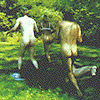Lars Von Trier | |

| Here's a confession: I've never really enjoyed Lars Von Trier's films. I failed in my attempt to sit through the whole way through Breaking The Waves, while I thought The Idiots was sprawling and self-indulgent, and Dancer In The Dark often just plain unbelievable. The work of his that I can summon some affection for is The Kingdom, his determinedly weird hospital soap opera. Nevertheless, I'm going to argue that the forty-four year old Dane is the most important film director working in Europe right now. He could well be the most significant non-Hollywood director in the world, and just possibly the biggest force in arthouse cinema since the glory days of Jean-Luc Godard. Which is not to say there aren't better directors out there. Or even that there aren't more skilled filmmakers than him in Von Trier's own circle: amongst the Dogme 95 films so far, Festen, Mifune and julien donkey-boy have more to offer in their very different ways than The Idiots. But that's not the point, just as saying that Truffaut was a better director than Godard - whether it was true or not - wouldn't change the fact that it was Godard who made things happen. Likewise, while there is a reasonable case for saying that the great cinematic countries of recent years have been China and Iran, not Denmark, that is also irrelevant. Why? Because like the young Godard, Von Trier forces people to think about what cinema does, or is. Although often controversial at home, those Chinese and Iranian films are simply either admired or ignored in the rest of the world. No-one in the West has ever had a vicious arguement about a Zhang Yimou movie. But mention Von Trier to anyone vaguely cinema literate, and you will get a reaction of some sort. Intended, of course: even the Prussian-sounding 'von' was added to his name to stir people up. To be actively anti-Von Trier - and many are - is to acknowlege his relevance. And he is relevant: he attracts the attention of people who otherwise couldn't care less. In the days when I was working at the now defunct Neon magazine, we had a notoriously arthouse-phobic editor (he now works at FHM ), but he was desperate to have Von Trier in the magazine. The process reached its peak at Cannes this year. Von Trier's new film, Dancer In The Dark, had already provided good press fodder because of the screaming battles between the director and his star, Bjork, before anyone had even seen the film. The screening was followed by massive outbreak of boos and cheers. Critics were vehemently convinced that they had either seen a masterpiece or one of the worst films ever screened at the festival. The Observer's Philip French compared it to Springtime For Hitler, the deliberately atrocious musical in Mel Brooks's The Producers . Variety decried it as 'artistically bankrupt in every sense.' Needless to say, it won the Palme D'Or. And even if the result was - as French and others thought - a travesty, it had made Cannes an event. We're told by the likes of Susan Sontag that there was a time when average students got excited by serious cinema, went around arguing about Carl Dreyer and Bergman and of course Godard. This has always had the ring of nostalgic myth to it: more sober observers point out that the supposed popularity of European films in the '50s and '60s had a lot to with sex. But if we are ever going to get back to the point where non-Hollywood films are considered exciting, then Von Trier is the man who can make that happen. And while Von Trier's talents as a professional irritant - through gestures like hanging a picture of Baden-Powell on his office wall, or wearing a kilt - are part of it, there is more to him than just that. What's remarkable about his rise to notoriety is how abrupt it has been. He doesn't even merit a mention in the 1994 edition of the Macmillan International Film Encyclopedia, although he had been making films for a decade then at that point. His early films, such as 1984's Elements Of Crime (released here in 1990) and 1991's Europa, were laced with cinematic in-jokes and praised for their beautiful visual style and design, drawing comparisons to the Expressionists and Welles. There was no doubting the craft and technique. "I had an almost fetishistic attraction to film technology," Von Trier said in 1996. This matters: you can't fully understand the Dogme 95 movement until you know that Von Trier was to a large extent rebelling against his own movies. After Europa he waited five years before making another feature (in the meantime, he made The Kingdom for Danish TV). And when he reemerged, with Breaking The Waves, the elaborate use of light and shadow and of staging, had vanished, replaced by the immediacy and urgency of handheld cameras. Everything was suddenly rough, raw. The documentary style of the filming deliberately cut across the overwraught emotions and religious frenzy of the film. Emily Watson, whose extraordinary performance makes it worth trying to watch at least, says 'If you look at the change between Europa and Breaking The Waves, he's thrown the rule book out of the window, and his relationship with actors completely changed, from bodies that you put somewhere to really being very in touch with his emotional state.' |

|
It certainly stirred people up, made the 'love it or hate it' cliche true. Even Von Trier's formerly supportive family were bemused. 'They have been severely critical toward it,' he admitted, 'My brother thought the film was indifferent and tedious and my uncle saw the whole thing as an abject failure from beginning to end.' Others were just made seasick by the wobbling camerawork. But it's not a bad film in any way, just one that is hard to take. There are certainly great moments in it, just as Dancer In The Dark contains one of the most astonishing scenes in cinema history. But both films wear you out, and contain so much sustained misfortune that tragedy starts slipping uneasily into farce. Which is a game that Von Trier is certainly playing, but it is a game that loses you the audience's sympathy swiftly. The Dogme 95 movement, with its Vows Of Chastity banning genre movies, soundtrack music, artificial lighting, sets and props, institutionalised the conversion Von Trier had made with Breaking The Waves. Without Von Trier's participation - he was by far the most famous member of the original four man brotherhood - Dogme 95 might not have been noticed at all. But after it grabbed headlines in a way that no cinematic movement had done since the Nouvelle Vague, it also amplified his fame. Were the rules a wind-up or was it serious? The answer is almost certainly both: it was meant to be provocative, to get filmmakers thinking about what they were doing, to liberate them from some of the excessively technical considerations they can get into - in the way Von Trier felt he had with Europa. But it comes as no surprise that the Dogme film which most blantantly flouts its own rules is The Idiots. It certainly got people talking. 'Why not have a club for painters where the only colour we're going to use is red?' asked a bewildered Spike Lee, while admitting that he had enjoyed Festen , ' I don't understand the thinking behind that.' And just as people were getting to grips with the idea of this 'chaste' cinema, Von Trier announced he was going to make a musical. It seemed like he had just done another 360 degree turn. But he hadn't. One of the strongest arguments in Von Trier's favour is this: you have to see his films to know what they are like. Is Mission: Impossible II unimaginable until you have seen it? No. The Perfect Storm? X-Men? Much as you suspect. But those are just so much Hollywood product, you could argue. Fine: before you see a Woody Allen movie, a Martin Scorsese film, or even a Chinese masterpiece like Raise The Red Lantern or something like American Beauty , you still have a pretty decent idea of what to expect. But I had been reading about Dancer In The Dark ever since it had been first announced, I'd read the production reports, heard all the rumours about Von Trier's battles with Bjork and read the reviews from Cannes, most of which thoughtlessly gave away the ending. And yet I still had no idea what this film was going to be like. Which has to be good. Critics were so confused many decided to make wildly innacurate comparisons to the work of Dennis Potter. He might not have won them over, but Von Trier sure had baffled them. Dancer In The Dark turns out not be trumpeted rejection of Von Trier's recent work. In fact, it has much in common with Breaking The Waves. Only it's a musical, with singing factory worker and singing lawyers. With Bjork and Catherine Deneuve. It is set in the US in the 1960s, although Von Trier has never been to America and the film was made in Sweden. It's a Danish film made in English with an Icelandic star with a weird Artic Circle mockney playing a Czech immigrant. The shooting style of the non-musical scenes is as fiercely naturalistic as The Idiots, but all the little details of the film work against the realism, ring untrue: the shortage of real Americans, the sense of place. Tangentialy, I'm reminded of Godard's Weekend , a film that confuses you by slipping from conventional realism into strange staginess without warning or explanation. Dancer In The Dark also leaves you so caught up in its idiosyncracies that it is not until later that you notice that the film is actually a straightforward political polemic, powered by a very northern European disgust of a country that rejects universal health care and embraces the death penalty. You can see why some people got so annoyed. And personally, I wasn't convinced by the film for a second, at least not until the devasting final moments. I thought Bjork was terrible. But everyone I saw the film with loved it. And even people who couldn't stand Breaking The Waves loved Dancer In The Dark, and vice-versa. People who hate Bjork liked the film, people who like Bjork hated it. And that's the part of the genius of Von Trier: he makes people react in unexpected ways, and there is not enough of that around. And more than anyone else in recent times, he has forced people to think about what they want from films. Even if you disagree with him completely - assuming you can work exactly where he stands at any point in time - he makes you clarify your position. Which is why great films will come from his influence, even if he doesn't make them himself. © Mark Morris 2000 |